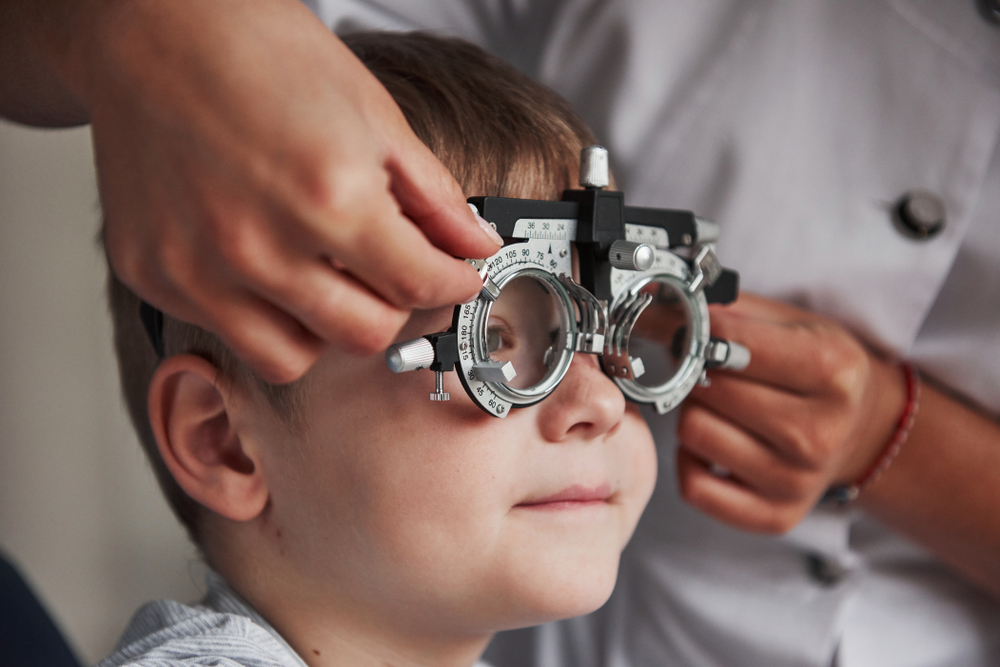
Clear eyesight plays a crucial role in a child’s ability to learn, socialize, and develop confidence. If a child can’t see the board at school or struggles to focus on books and screens, it can impact their performance and even their behavior. At GrandView Eyecare, we see families from Fairbury, Hebron, and the surrounding areas who often don’t realize their child is struggling with vision issues until school performance or daily activities become a challenge. The good news is that early detection can make all the difference.
Signs Your Child May Have a Vision Problem
Children don’t always know how to describe vision problems, especially if they think what they see is “normal.” That’s why it’s important to watch for these common warning signs:
Frequent Squinting or Head Tilting: If you notice your child squinting when trying to read or tilting their head to see better, they may be compensating for blurry vision. This could indicate nearsightedness, farsightedness, or even a muscle imbalance.
Holding Books or Screens Too Close: Does your child sit just inches from the TV or hold books unusually close? This could be a sign of nearsightedness (myopia) or difficulty focusing.
Complaints of Headaches or Eye Strain: Headaches after school or eye fatigue may be linked to uncorrected vision problems. If their eyes are working too hard to focus, discomfort often follows.
Trouble with Hand-Eye Coordination: Vision plays a big role in sports and activities that require precision. If your child struggles with catching a ball, writing neatly, or maintaining balance, it may be due to an undiagnosed vision issue.
Difficulty in School or Short Attention Span: Kids with vision issues may avoid reading, writing, or homework because it's frustrating. This can sometimes be mistaken for a learning difficulty or behavioral issue.
Covering One Eye or Rubbing Their Eyes Excessively: If your child frequently covers one eye while focusing or rubs their eyes even when they’re not tired, they may be compensating for double vision or eyestrain.
When to Schedule a Pediatric Eye Exam
Even if your child isn’t showing noticeable signs of vision problems, routine eye exams are essential. The American Optometric Association recommends:
First eye exam between 6 to 12 months old
Another exam at age 3
A comprehensive eye exam before starting school at age 5 or 6
Annual exams thereafter
Whether it’s your child’s first eye exam or you suspect an issue, we’ll take the time to assess their vision, answer your questions, and ensure they have the best possible start.
What to Expect During Your Child’s Eye Exam
At GrandView Eyecare, our goal is to make the experience comfortable, informative, and even fun! During the exam, we’ll start with a conversation about your child’s vision history, any concerns you’ve noticed, and how they’re doing in school or activities.
Then, we’ll perform a series of tests to assess their eyesight, eye movement, and overall eye health. These tests may include reading an eye chart, checking depth perception, and using specialized equipment to examine the inside of their eyes. If glasses or myopia management treatment is needed, we’ll guide you through the best options for their age and lifestyle. Most importantly, our friendly team ensures that every child feels at ease, making the process smooth and stress-free for the whole family.
Schedule Your Child’s Eye Exam Today
Your child’s vision plays a crucial role in their learning, development, and daily life. Catching potential issues early can make all the difference in their confidence and success. Whether they’re experiencing symptoms of a vision problem or it’s simply time for their routine checkup, we are here to help.
Schedule your child’s eye exam with GrandView Eyecare, and ensure they’re seeing the world as clearly as possible. Visit our office in Fairbury or Hebron, Nebraska. Call (402) 729-6162 or (402) 768-6651 today.







